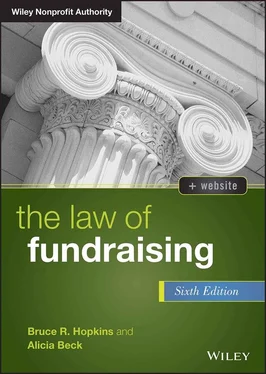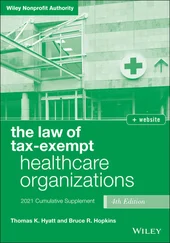Bruce R. Hopkins - The Law of Fundraising
Здесь есть возможность читать онлайн «Bruce R. Hopkins - The Law of Fundraising» — ознакомительный отрывок электронной книги совершенно бесплатно, а после прочтения отрывка купить полную версию. В некоторых случаях можно слушать аудио, скачать через торрент в формате fb2 и присутствует краткое содержание. Жанр: unrecognised, на английском языке. Описание произведения, (предисловие) а так же отзывы посетителей доступны на портале библиотеки ЛибКат.
- Название:The Law of Fundraising
- Автор:
- Жанр:
- Год:неизвестен
- ISBN:нет данных
- Рейтинг книги:4 / 5. Голосов: 1
-
Избранное:Добавить в избранное
- Отзывы:
-
Ваша оценка:
- 80
- 1
- 2
- 3
- 4
- 5
The Law of Fundraising: краткое содержание, описание и аннотация
Предлагаем к чтению аннотацию, описание, краткое содержание или предисловие (зависит от того, что написал сам автор книги «The Law of Fundraising»). Если вы не нашли необходимую информацию о книге — напишите в комментариях, мы постараемся отыскать её.
The Law of Fundraising
The Law of Fundraising
The Law of Fundraising — читать онлайн ознакомительный отрывок
Ниже представлен текст книги, разбитый по страницам. Система сохранения места последней прочитанной страницы, позволяет с удобством читать онлайн бесплатно книгу «The Law of Fundraising», без необходимости каждый раз заново искать на чём Вы остановились. Поставьте закладку, и сможете в любой момент перейти на страницу, на которой закончили чтение.
Интервал:
Закладка:
In May 2016, Minnesota's attorney general filed a lawsuit against Associated Community Services, Inc. for sending false pledge reminders to donors and making other misleading statements in a campaign to solicit contributions for the Foundation for American Veterans. According to the complaint, the company had an extensive history of misconducting solicitations for charities.
The attorney general of New York announced in November 2016 that the office had settled its case against the National Vietnam Veterans Foundation. According to a statement, nearly all of the funds raised through the Foundation's direct-mail efforts were used to pay its fundraisers. It is said that in 2014, for example, the Foundation devoted $7.7 million of the $8.6 million raised to fundraising. It is further stated that the “fraction” of the money that went to the Foundation “was further reduced by a pattern of abuse, mismanagement, and misspending” by its former president. That individual and the Foundation's vice president are now subject to a “permanent nationwide ban” on access to and decision-making with respect to charitable assets.
In September 2017, the Michigan attorney general announced a settlement with Breast Cancer Outreach Foundation, Inc., a Florida nonprofit corporation, resolving the attorney general's claims that the organization deceptively raised $1.4 million nationwide in 2015. The organization's solicitations stated that funds would be used for breast cancer research grants. In reality, all of the money raised, other than one grant, was paid to professional fundraisers and for other expenses unrelated to breast cancer research. As part of the settlement, the Foundation was required to pay $150,000, with $125,000 paid for breast cancer research and the remaining $25,000 to recover the state of Michigan's investigative costs. The organization was also banned from soliciting in Michigan for 10 years.
In November 2017, New York's attorney general announced a settlement with Yisroel Schulman, the former president of the New York Legal Assistance Group, Inc. (NYLAG), for breaching his fiduciary duties of care, loyalty, and obedience to NYLAG, a charity providing free legal services to low-income New York residents, and other charities with which Schulman was affiliated. The settlement was reached after an extensive investigation by the Charities Bureau of the attorney general's office, which led to the filing of a complaint in the New York Supreme Court. The attorney general's investigation found that from around 1998 through 2013, Schulman diverted millions of dollars from NYLAG to other charities that he controlled. These funds were diverted to various donor-advised funds and similar accounts. In choosing donor-advised funds to hold NYLAG's funds instead of an investment account, Schulman breached his duty to prudently invest and safeguard the assets of NYLAG. Schulman settled with the attorney general. Pursuant to the settlement agreement, Schulman agreed to pay $150,000 to NYLAG. The settlement also banned Schulman from serving as an officer or director of any New York nonprofit organization for five years.
In October 2018, the Minnesota attorney general filed a lawsuit against the American Federation of Police and Concerned Citizens, Inc. (AFPCC) for deceptively representing that contributions it received would be used to help families of officers killed in the line of duty. The attorney general found that only 17 percent of AFPCC's spending in 2017 and just 9 percent of the $4 million it received in total donations were used for charitable purposes. In July of that year, the Virginia attorney general announced that the office was taking legal action against two charities, Hearts for Heroes, Inc., and Operation Troop Aid, Inc., alleging they both had used donations to benefit their organizations instead of helping veterans and troops. This suit and settlement were part of a 16-state action. According to a release from the Virginia attorney general's office, the Operation Troop Aid, Inc. settlement required it to dissolve and prohibits its CEO from assuming any fiduciary role with a nonprofit corporation or soliciting on a nonprofit corporation's behalf.
In July 2019, the New York attorney general announced an investigation into the website www.NYCharities.org, alleging that the online fundraising platform failed to distribute hundreds of thousands of dollars to New York charities in 2018 and 2019. This investigation was based on more than 100 complaints from individuals and organizations, including those with unpaid contributions ranging from $200 to more than $100,000.
In September 2020, the FTC filed a complaint in the Southern District of New York against Outreach Calling, a fundraiser, its owner, two related organizations, and three other individuals. The attorneys general of Virginia, New York, New Jersey, and Minnesota joined the FTC as plaintiffs. The plaintiffs alleged that the defendants engaged in deceptive telemarketing schemes on behalf of several sham charitable organizations. The complaint states that Outreach Calling induced tens of millions of dollars in charitable donations by telling donors that the recipient charities provided assistance to the most vulnerable populations such as homeless veterans and cancer patients. The plaintiffs stated that, in reality, the recipient charities spent very little on charitable programs—in same cases, as little as 1 or 2 percent of gross donations. Instead, around 90 percent of the funds raised was paid to Outreach Calling, and most of the rest was paid to fund personal expenses of the charities' principals. The FTC also brought a separate action in January 2021 against a predatory fundraising practice. These two actions ultimately resulted in consent judgments against for-profit fundraisers amounting to $111.7 million and $58.5 million, respectively.
These episodes are, unfortunately, only a few in a series of similar exposés that have haunted legitimate charities for years and helped taint the term fundraising . 55 These events also fueled development of the machinery that has been built by and for government to regulate fundraising by charitable organizations. Many an aspiring or practicing politician has parlayed a probe of a charity “scandal” into high office. Thus, Time magazine, for example, was moved to characterize the Pallottine order scandal as indicative of widespread wrongdoing: “The Pallottine mess provides Americans with one more excuse not to give money to church agencies, even those that make full public accountings” 56 and the “Pallottines were not the only agency that used 80 percent or more of their [sic] gifts to cover the exorbitant costs of direct mail.” 57
Other episodes—isolated instances having major impact on public and regulatory attitudes—include the solicitation activities of Father Flanagan's Boys Town, the Sister Kenny Foundation, the Police Hall of Fame, 58 the Freedom for All Forever Foundation, the Korean Cultural and Freedom Foundation, 59 and the Children's Relief Fund. 60 Thus, the media remain alive with one report after another of the alleged misdeeds of charities. Invariably, the scandals involve solicitations of charitable contributions from the public, by or for organizations that derive their principal support from public giving, 61 with an ostensibly excessive amount of funds devoted to direct-mail campaigns, questionable investments, or administration. 62 At the same time, these developments should be kept in perspective, in that the organizations involved represent only a very small segment of the charitable community.
A few decades ago, federal regulation of fundraising for charity did not exist (other than by means of the charitable contribution deduction), and state regulation in the field was just beginning to flower. Before that time, fundraising regulation (such as it was) was a combination of occasional IRS audits and state attorneys general inquiries, the latter predicated on their historical role of enforcing the requirements imposed on the administration of charitable trusts. 63 These efforts were based on one premise, and today's vast and growing governmental apparatuses overseeing charitable fundraising continue to be guided by that premise: “The greatest possible portion of the wealth donated to private charity must be conserved and used to further the charitable, public purpose; waste must be minimized and diversion of funds for private gain is intolerable.” 64 Out of the inadequacies of common law principles and tax enforcement efforts has grown—and is still growing—a comprehensive supervisory and regulatory program governing the fundraising efforts by charitable organizations at the federal, state, and local levels.
Читать дальшеИнтервал:
Закладка:
Похожие книги на «The Law of Fundraising»
Представляем Вашему вниманию похожие книги на «The Law of Fundraising» списком для выбора. Мы отобрали схожую по названию и смыслу литературу в надежде предоставить читателям больше вариантов отыскать новые, интересные, ещё непрочитанные произведения.
Обсуждение, отзывы о книге «The Law of Fundraising» и просто собственные мнения читателей. Оставьте ваши комментарии, напишите, что Вы думаете о произведении, его смысле или главных героях. Укажите что конкретно понравилось, а что нет, и почему Вы так считаете.












